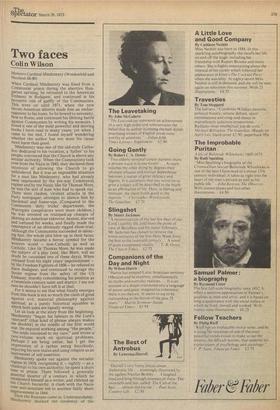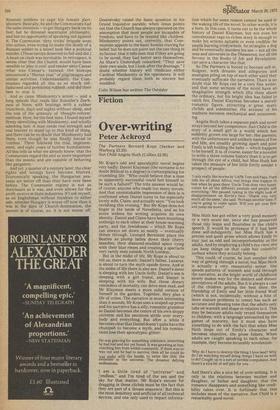Two faces
Colin Wilson
Memoirs Cardinal Mindszenty (Weidenfeld and Nicolson £6.00)
When Cardinal Mindszenty was freed from a Communist prison during the abortive Hungarian uprising, he retreated to the American Embassy in Budapest, and continued in his favourite role of gadfly of the Communists. This went on until 1971, when the new Soviet-American détente made him an embarrassment to his hosts. So he bowed to necessity, flew to Rome, and continued his lifelong battle against Communism by writing his memoirs. I found it one of the most powerful and moving books I have read in many years; yet when I came to the end, I found myself wondering Whether the author has not done his cause more harm than good.
Mindszenty was one of the old-style Catholics: dedicated to his vocation, a 'father' to his people, convinced that the Church is above any secular authority. When the Communists took over from the Nazis in 1945, they declared their intention of allowing the Church to go unhindered. But it was an impossible situation for a man like Mindszenty, who had already been imprisoned by the pre-war Communist regime and by the Nazis; like Sir Thomas More, he was the sort of man who had to speak out. There were clashes, virulent attacks in the .Party newspaper, attempts to silence him by blackmail and frame-ups. (Compared to the Communist 'dirty tricks' department, the Watergate conspirators were mere children.) He was arrested on trumped-up charges of Plotting an American takeover, beaten, starved and tortured for weeks, and finally made the centrepiece of an obviously rigged show-trial. Although the Communists succeeded in silencing him, the whole plot blew up in their faces. Mindszenty became a heroic symbol for the western world — non-Catholic as well as Catholic. Like Sir Thomas More, he was made the subject of a play (and, like More, will no doubt be canonised one of these days). When released from his eight years' imprisonment — by the Freedom Fighters of 1956 — he refused to leave Budapest, and continued to enrage the Soviet regime from the safety of the US Embassy, thereby consolidating his position as a twentieth-century saint and martyr. I am not sure he shouldn't have left it at that.
For it seems to me that what finally emerges from this book is not so much the clash of good against evil, material philosophy against spiritual, as a purely historical squabble in Which both sides are equally wrong. Let us look at the story from the beginning. Mindszenty "began his labours in the Lord's vineyard" (that kind of phrase always makes me shudder) in the middle of the first world war. He enjoyed working among "the people," the souls entrusted to my care," and wrote a two-volume work on spiritual problems. Perhaps I am being unfair, but I get the impression of a rather smug busybody, enjoying his new status and using religion as an instrument of self-assertion. Mindszenty spoke out against the socialist regime in 1919, recognising it — rightly — as a challenge to his own authority; he spent a short time in prison. There followed a generally peaceful quarter of a century in which he established himself as a writer, and climbed up the Church hierarchy. A clash with the Nazis over anti-semitism led to another fairly short imprisonment in 1994.
Then the Russians came in. Understandably, Mindszenty disliked the tendency of the
Russian soldiers to rape his female p'arishioners. Basically, he and the Communists had the same intention — to get Hungary back on its feet; but he detested materialist philosophy, and lost no opportunity of speaking out against it. The Communist 'dirty tricks' brigade went into action, even trying to make the death of a Russian soldier in a brawl look like a political murder. (These tactics deserved to fail and did.) A head-on clash was inevitable. In retrospect, it seems clear that the Church would have been sensible to 'play it cool' and render unto Caesar what was Caesar's. Instead, the bishops announced a "Marian year" of pilgrimages and similar activities. Understandably, the Communists regarded all this as so much oldfashioned and pernicious rubbish, and did their best to stop it.
And so came Mindszenty's arrest — and a long episode that reads like Koestler's Darkness at Noon, with beatings with a rubber truncheon, days and nights without sleep, and the rest of the armoury of 'thought-reform' methods. Here, for the first time, I found myself firmly identifying with Mindszenty, and wholly admiring him. A man needs real strength and real bravery to stand up to this kind of thing, and there can be no doubt that Mindszenty had them, even though he was finally forced to 'confess.' There followed the trial, imprisonment, and eight years of further humiliations. All this tells us what we already knew: that the Communists regard the end as more important than the means, and are capable of behaving like gangsters.
And yet, a quarter of a century later, the clear rights and wrongs have become blurred. Economically speaking, the Hungarian peasants are better off than they have ever been before. The Communist regime is not as doctrinaire as it was, and even allows for the profit-motive in State industries. If! ask myself,. as an Englishman without loyalties to either side, whether Hungary is worse off now than it was in the days of Church-domination, the answer is of course, no, it is not worse off. Dostoevsky raised the basic question in his Grand Inquisitor parable, when Jesus points out that the Church has always operated on the assumption that most people are incapable of freedom, and have to be treated like children. Mindszenty points out, correctly, that Communism appeals to the basic human craving for belief; but he does not point out the one thing in its favour: that it tells men that if they are going to be saved, they had better save themselves. As Shaw's Undershaft remarked: "They save their own souls, but I look after the drainage." I doubt whether history will vindicate either Cardinal Mindszenty or his opponents. It will probably regard them both as sincere but muddled.
Colin Wilson has written The Outsider



































 Previous page
Previous page